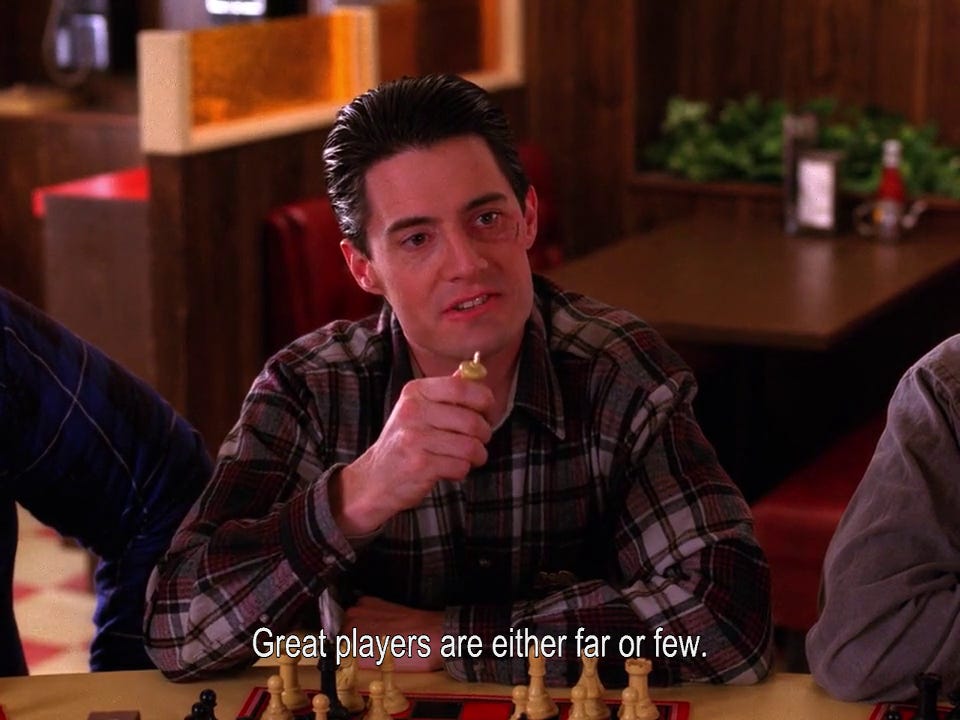Floating with David
You: "Elaborate on that." Me: "No[t yet]." / Thoughts on the passing of David Lynch, and Twin Peaks.
David Lynch died today, and I'm sad about it, like a lot of other people. While I'm late to David's work, I feel like it's special to me in a way that many other things aren't.
I generally struggle with sitting down to watch movies or TV1. "YouTube, on another monitor" is probably something that would piss David off, but Twin Peaks was one of the few things to have my enraptured attention. As a habitual wiki-reader, I spoiled myself years ago, thinking that I probably would never touch it; last year, I was happy that you can't convey “vibes” in a wiki, and that my memory got spotty.
People want to live in towns like Twin Peaks, WA. They want to be like Agent Dale Cooper. They have adversaries like Albert Rosenfield. They want to find people like Harry S. Truman and make them their friends. They want to find love like Annie (Season 2 notwithstanding), and see couples like Big Ed, Nadine and Norma, or Shelly, Bobby and Leo ruin each others' lives all the time. They might've gone to school with someone like Donna, James or Laura. They might've knew parents like the Haywards, the Briggs' or the Palmers.
They enter, grow, change, hide secrets, intermingle, stay or exit.
It's one thing to write a show that "feels like home", but it's genuinely very difficult to imbue it with a spirit; David Lynch had the ability to do that through sincerity, authenticity, and a talent for grounding the weird or experimental in very human emotions. Obviously the show wasn't made by him alone, but what I'm talking about is very much gone when he is, and returns when he does.
No matter how strange the events of Twin Peaks gets, it's still about its people. Even if characters are flawed, or evil, they still have a lot of love, or passion, in their hearts.
I find myself re-watching Twin Peaks when my soul feels cold, and needs a bit of time by the fire — that's made it something I'm very grateful for. When it's rare, you forget it's even possible, sometimes, and it feels special to be cognizant of what something does to you. Because of that, I have a lot of patience for it, even when it gets as bad2 as people say in Season 2.
Creating art is very difficult, partially because your confidence and value in your intuition can be fluid; as I'm writing this piece, I'm trying to be open and authentic, but it's a deliberate choice, and not something that happens naturally. When I see bits of behind-the-scenes stuff with Lynch during his work on Twin Peaks: The Return, or when we get served his infamous meme clips or interview non-answers, I get the sense that he was someone who believed in his vision because it had the potential to take him somewhere.
It wasn't specifically about him having ideas, fully-formed, and knowing that they were right: it was that he had an innate trust in himself that his instrincts would guide him to where he could find the right choice.
David was in tune with the universe and his own imagination on a level that seemed to be the best version of human. He was not interested in answers because he understood that questions are the drive that make us who we are. They are our breath.
When I think about that affinity for questions, and the ones I've myself stopped asking, I connect it with the fear of the resulting answers. They can be cruel, cold, uncaring — the possibility can seem so painful that it keeps people from risking hurt to see the possibility of where that chaos can be positive. As I read today (and am going to paraphrase): "You don't get an entire concept named after you without being genuinely good." All the memes about things being "downright Lynchian" are a result of a man's ability to play in the interstice of questions and answers.
You need either courage, acceptance or both to live in that sphere constantly — it's ceding the idea that you're in control, and that you control your creative flow.
Sometimes, the river carries us places, and I admire David's ability to accept the current.
Video clips from this piece are taken from RedLetterMedia’s “Twin Peaks: The Return - re:View (Part 2)”. I recommend their Part 1, as well, along with their Fire Walk With Me re:View. Also, their David Lynch trivia gameshow, just to see Mike Stoklasa’s reaction to the question “What is garmonbozia?”
One day I will watch his films, but I’m comfortable where I am, right now.
It’s probably the ADHD.
I still don’t think it’s as bad as people make it out to be.






I completely relate to the not being able to sit down and focus on one thing. My mind likes to wander. I figure I should let it.
Adam Naymam wrote this yesterday, thought I’d share:
My second David Lynch story takes place before the first one. In 2001, I covered the Toronto International Film Festival for the first time, and somehow ended up getting thrown into a hotel room with Lynch for a 10-minute Q&A. He was there to promote Mulholland Drive, which I had watched a couple of days earlier. I was 21, and didn’t know then that asking Lynch to explain his work was a bad idea. He didn’t answer my question about the meaning of a particular sequence in the film, which turned out to be the last question I had time to ask. But then, when the tape recorder was off, he smiled and said, “A thing is what it is, and that’s what it wants to be.”
———
Rest in peace David Lynch you will be missed. 🕊️